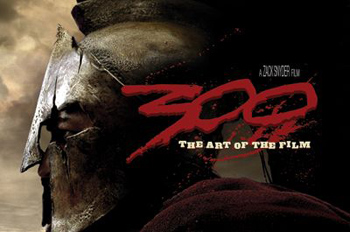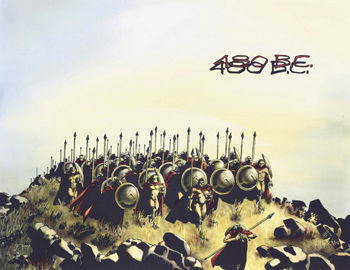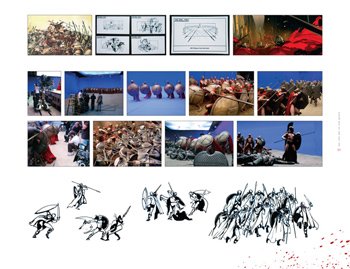
Dark Horse Publicist Jeremy Atkins and Online Marketing Manager Matt Parkinson recently had a chance to speak with 300 director Zack Snyder (Dawn of the Dead) and discuss his work on the soon to be box office monster, 300, based on the critically acclaimed graphic novel by Frank Miller and Lynn Varley. The below is a transcript of the phone conversation that took place.
Jeremy Atkins: Hey Zack, how's it going?
Zack Snyder: I'm really good. How are you guys doing?
Matt Parkinson: Everthing's going great with us on our end.
JA: I'm sure you're a busy guy.
ZS: Yeah, it's a little bit of a freakshow here, but it's fine.
JA: We appreciate the time. In advance we'll warn you, of course we have some of the questions I'm sure you're sick of answering.
ZS: Like how did the project come about?
MP: That's a perfect segue into our first question.
JA: You might as well answer that one now.
ZS: I was a fan, of course, how could you not be, and I never thought actually we'd get the rights and he'd be into it, you know what I mean. I was a fan of 300. We went after 300 because I was really struck by the combination of story, art, and color in that book and how cinematic it was. My feeling was if you could get those images on a movie screen you'd be doing something different from what has been seen in cinema. It was another experience. I thought that was a big deal.
It was funny because when I was making the movie, I would say, "This is going to be like nothing you've ever seen." And people would go, "Oh yeah, anyway, it's like what everybody says," and I'd go, "No really!" I think now it was funny because someone said to me the other day "'It's like nothing I've ever seen" and I said, "That's what I used to say!" I don't even say it anymore because I'm exhausted by it, but it's funny because that is the experience in the end.

JA: Are you pretty happy with the way it turned out?
ZS: I really am. With so many things, it's about a consistency of vision. I think the aggregate of the movie is you go to a single world. You go to a single perspective and that perspective is consistent and beautiful and all the things I wanted it to be. And for that reason I really am very, very happy. It's a lean movie. It just sort of is a powerful, surging locomotive. It just wants to grind you to dust.
JA: So you're saying it's not the Lord of the Rings trilogy.
ZS: No.
MP: When it came time to edit the movie, did you end up with a lot of extra footage?
ZS: No, there's barely any extra footage. It's pretty much the movie we shot. And it is what you see. I think the DVD extras are like, two sequences. It's kind of sad in that way because with the DVD, you want more of that.
JA: But at the same time, if you get a movie that's engaging enough as it stands, people are going to buy it anyway. I think people have gone a little crazy with the DVD extras at this point. Too much of a good thing, maybe.
MP: What was the biggest challenge you had to overcome when you were making this film?
ZS: I think the biggest challenge was the production methodology and how it was going to be rendered. When you're sitting in an office, you're talking about, "Oh, I'm going to make 300 into a movie." I'm very hands on with that kind of production methodology. I have a lot of ideas about, "Okay this is a smart way to do it." So sitting with my guys, that part of it, the actual physical act of saying, "We should have this, this, and this in the movie. We should do it this way. It should be green screen with one walk, and this and dirt over here." That stuff was most challenging, but on the other hand, it was also the most fun because I felt like the movie was real at that point.
JA: What were the kinds of disadvantages and advantages of doing this in a green screen process?
ZS: The advantage, of course, is the world is as big as you want to make it once you've filmed it. The disadvantage is that the actors don't know where the hell they are or what they're doing. They have to rely on me to know what they're doing and where the hell they are. That was fine it just was exhausting to have everyone constantly saying "Where is everything? Where am I? Where is the sun?" I'd say, "Where the lights are above me, that's up."
JA: Some normal things you've lived with for the last thirty years still apply.
ZS: A lot of those things still apply. Like if I throw this rock at you, it will hurt.

JA: Obviously, doing this movie probably caused you to do a lot of research on Greek and Persian armies. What was the most interesting thing you learned about this culture and the history of this? Did you get a good feel for that outside of Frank's work?
ZS: I did a lot of research. A lot of it I felt like I had a responsibility to know, like you have to know the rules before you break them. I feel like Frank beautifully distilled that moment in history down to its essence. Even with my research, there's nothing I would really add or change about what Frank did, although I would say that the sort of Spartan way of rearing a child I found really fascinating and what I would call the sort of state-sponsored abuse.
It's funny because my son actually plays the young Leonidas in the movie. Not the one that fights the wolf but before. He fights his father and then he learns from him and then he beats the crap out of the other kid. That's my son, Eli. It's kind of interesting. It's got a lot of things that I do at home, so it worked out.
JA: I was going to say, is that based on a little bit of real life?
ZS: We're just like, we'll just do what you've been doing the last eight years of your life.
JA: Now you just have to graduate him to fighting wild animals in the backyard.
ZS: That will be next year.
MP: It's good that you're giving him time.
ZS: I've sent someone up to Alaska to find a nice big wolf. They haven't been able to track one down as of yet. But they tell me soon.
JA: You've arrived now. You can just ship that in.
ZS: Which is sweet. That you can get endangered species dropped off at the house. It's kind of fun.
JA: That's when you know you've made it.
ZS: It's Gladitorial.

MP: In regards to working with Gerard [Butler], how did you come to cast him?
ZS: The first time I met Gerard, I had seen his other movie, but I wasn't like, "That's my king." When I met him and we talked, I knew. I pretty much knew that was it. From then on, I was like, "Okay. So Gerry's Leonidas." He was in the coffee shop, standing, striking poses, fighting, acting out a lot of the movie for me and it was good stuff. And I was like, "That's awesome."
JA: It was kind of like discovering Eddie Furlong in the arcade, except it was in Starbucks.
ZS: Exactly.
JA: Have you always been a comic book fan?
ZS: I came to comic books through Heavy Metal magazine. I was into fantasy art when I was a youngun, and my mom used to buy me Heavy Metal not really realizing it was an adult illustrated fantasy magazine, thought it was just cute and never opened it, thank god. I'm like a ten-year-old or younger at the time, and she would say things like, "You know this is quite a provocative cover." I'd say, "Yeah, I don't know." She'd say, "Huh, okay." So what happened is my aesthetic got warped pretty early. I would get comic books for Christmas and stuff from my mother--X-men or whatever--and I would say, "No one has sex or gets killed in this. It's not that exciting. It's not really doing it for me." That was disturbing to her, I could tell.
MP: Enter Frank Miller
ZS: Exactly. Here comes Frank and I'm like, now this is a guy I can get into. This guy gets me.
JA: Speaking of Frank, were there any obstacles you had to overcome with the storytelling process? You look at the graphic novel and like you said, it's almost so right for cinema because it is so cinematic in the way you read it. It's very panoramic. Do you feel like there were any obstacles you had to overcome when you were trying to tell the story in the same way, with the same flow, as the graphic novel?
ZS: I don't think so. Really the obstacle was getting out of the way of it as much as I could. It's like anything. You can't help it. It's going to go through you. You're a filter as a director. I really wanted the audience to have the experience that I had when I read 300. I wanted to see if I could make them enter a world like I did when I opened the pages of that book. The challenge was not so much with the material; it was getting out of the way of the material.
MP: Did you use any other films as reference materials for this? Something like Ben Hur, Gladiator, or Lord of the Rings?
ZS: Excalibur probably more than anything, which is one of my favorite movies of all time. The thing that I love, it's very operatic. 300, I'd say, is the opera of Thermopylae, that's what Frank wrote. That's the movie I made. It's more of an opera than Gladiator, but with violence, of course. Great violence. I just made it into an aesthetic and sort of tableau-ish presentation. And I felt that way about Excalibur. It takes a world and it turns it into mythology. That's what Frank did with 300. I think the mythological elements in Excalibur are so fun. It was one of those movies [that] always struck me as a child. And it was sexy too.
Zack Snyder (right) signing at the Dark Horse booth during WonderCon '07

MP: As far as upcoming projects in the works, can you talk about that? More specifically, can you say anything about Watchmen?
ZS: I'm on Watchmen right now and I'm excited about it. I'm hammering away at it. I want to make it and they want me to do it, so it's looking good.
MP: We'd certainly like to see you make it.
ZS: For people that don't know what Watchmen is, it's sort of the same trick that Alan Moore played on all of us when Watchmen came along. You picked it because you thought it was a comic book, and by the end of it, your mind was blown. I kind of feel like the movie-going public is in the same place that the comic book world was in when that graphic novel came out, in the sense that we've got Batman, Superman, Fantastic Four, X-Men, Spider-man,and Daredevil. The average moviegoer is as familiar with superhero franchises as the average kid comic book reader was. In some ways, Watchmen has to do in the cinema what it did in the comic book store in the sense that the knee jerk to Watchmen is going to be, "I should go see this new superhero movie, Watchmen." And then I get in it and I'm like, "What the hell?"
JA: That's awesome. I think the world is in the palm of your hand with that one. It is such a totally different story for anyone who hears it's adapted from a graphic novel. The only Alan Moore thing that has been adopted really at this point is V for Vendetta on a wide scale. Even that, there's still sort of an element of that comic booky feel. You have a lot more of an opportunity to escape with Watchmen.
ZS: They personalized the movie more than I'm going to do. It's my intent to again try to get out of the way if I can of the book. Of course you can't because it's such fun material. One of the big things we did is when I got the property, I moved it back to 1985. There's certain things you do when you make a movie and there's certain concessions you have to make. On the other hand, it's getting at the essence; I feel like it's closer to Strangelove than it is to Fantastic Four.
MP: That's pretty much all we've got, Zack. Thanks again for taking some time to talk with us!